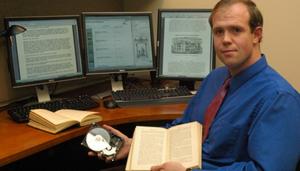In this age of big data, would it surprise you to learn that supercomputers are on track to predicting wars, revolutions and other societal disruptions? Scientist Kalev Leetaru is one of the foremost proponents in the emerging field of predictive supercomputing. His research helped usher in the era of "petascale humanities," where computers can identify useful or interesting patterns if provided with sufficiently large data repositories.
Yahoo Fellow in Residence at Georgetown University in Washington, DC, and formerly affiliated with the Institute for Computing in the Humanities, Arts and Social Science at the University of Illinois, Leetaru amassed a collection of over one hundred million articles from media outlets around the world, spanning 30 years, with each item translated and tagged for geography and tone. Leetaru analyzed the data with a shared memory supercomputer called Nautilus, creating a network with 10 billion items connected by one hundred trillion semantic relationships.
The 30–year worldwide news archive was part of a 2011 study called Culturomics 2.0: Forecasting large–scale human behavior using global news media tone in time and space. The findings were impressive, pointing to a degree of predictive ability, greater than chance would account for. The events the could be predicted include the revolutions in Tunisia, Egypt, and Libya, including the removal of Egyptian President Mubarak. The corpus also correctly anticipated a period of stability for Saudi Arabia.
Leetaru takes this to mean that it's possible to predict major upheavals, like the Arab Spring, with some degree of confidence.
"It's like a weather forecast," he says in a recent Kernel article. "A 70 per cent chance of rain tomorrow means that it might not rain, but it's probably worth bringing an umbrella, because the conditions for rain are there."
http://www.hpcwire.com/hpcwire...
www.kalevleetaru.com
Can Supercomputers Predict the Future? (3)
Eestlased USAs | 13 Sep 2013 | EWR
Viimased kommentaarid
Kommentaarid on kirjutatud EWR lugejate poolt. Nende sisu ei pruugi ühtida EWR toimetuse seisukohtadega.
“Lugeja” is correct about both computer programmes and the effect called “self fulfilling prophesies”. Both a simplistic computer model (programme) as well as an “over specified” one will, in general, fail in forward forecasts. The other side of the coin to “self fullfilling prophesies” is averted-predictions. Both are results of the human element in our society’s feed-forward and feed-back loops… destabilisation and stabilisation respectively.
Data Mining is now “big business” so I am not surprised to see Academia (and Leetaru) pursuing this line. I do wish him success, but am inherently sceptical… the best “pattern recogniser” is a human. The best intelligence analyst is a human. I don’t discount a supercomputer possibly becoming an indispensable aid, though.
Data Mining is now “big business” so I am not surprised to see Academia (and Leetaru) pursuing this line. I do wish him success, but am inherently sceptical… the best “pattern recogniser” is a human. The best intelligence analyst is a human. I don’t discount a supercomputer possibly becoming an indispensable aid, though.
Lisaks:
Today's supercomputers do not actually make predictions, they do help humans to make predictions. It is an extension of our capabilities like binoculars are. Without a program supercomputers do nothing. With a program the do exactly as the program directs. Well-written program helps us to handle more data we normally can without it. Perhaps it is correct to say supercomputers help us to see more clearly through noise.
Today's supercomputers do not actually make predictions, they do help humans to make predictions. It is an extension of our capabilities like binoculars are. Without a program supercomputers do nothing. With a program the do exactly as the program directs. Well-written program helps us to handle more data we normally can without it. Perhaps it is correct to say supercomputers help us to see more clearly through noise.
As the article points out there are trends and events that can be predicted with some probabilities. An interesting feature of the predictions is "self-fulfilling prophesy". The predictions themselves may affect some events or timelines.
Eestlased USAs
TRENDING


























